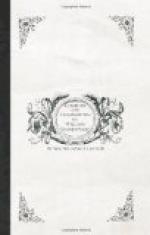Willy took heart, and lowering his voice, which hath much natural mellowness, repeated these from memory:-
“My briar that smelledst sweet
When gentle spring’s first
heat
Ran through thy
quiet veins, —
Thou that wouldst injure none,
But wouldst be left alone, —
Alone thou leavest me, and nought of thine remains.
“What! hath no poet’s
lyre
O’er thee, sweet-breathing
briar,
Hung fondly, ill
or well?
And yet methinks with thee
A poet’s sympathy,
Whether in weal or woe, in life or death, might dwell.
“Hard usage both must bear,
Few hands your youth will rear,
Few bosoms cherish
you;
Your tender prime must bleed
Ere you are sweet, but freed
From life, you then are prized; thus prized are poets
too.”
Sir Thomas said, with kind encouragement, “He who beginneth so discreetly with a dog-rose, may hope to encompass a damask-rose ere he die.”
Willy did now breathe freely. The commendation of a knight and magistrate worked powerfully within him; and Sir Thomas said furthermore, —
“These short matters do not suit me. Thou mightest have added some moral about life and beauty,—poets never handle roses without one; but thou art young, and mayest get into the train.”
Willy made the best excuse he could; and no bad one it was, the knight acknowledged; namely, that the sweet-briar was not really dead, although left for dead.
“Then,” said Sir Thomas, “as life and beauty would not serve thy turn, thou mightest have had full enjoyment of the beggar, the wayside, the thieves, and the good Samaritan,—enough to tapestry the bridal chamber of an empress.”
William bowed respectfully, and sighed.
“Ha! thou hast lost them, sure enough, and it may not be quite so fair to smile at thy quandary,” quoth Sir Thomas.
“I did my best the first time,” said Willy, “and fell short the second.”
“That, indeed, thou must have done,” said Sir Thomas. “It is a grievous disappointment, in the midst of our lamentations for the dead, to find ourselves balked. I am curious to see how thou couldst help thyself. Don’t be abashed; I am ready for even worse than the last.”
Bill hesitated, but obeyed:-
“And art thou yet alive?
And shall the happy hive
Send out her youth
to cull
Thy sweets of leaf and flower,
And spend the sunny hour
With thee, and thy faint heart with murmuring music
lull?
“Tell me what tender care,
Tell me what pious prayer,
Bade thee arise
and live.
The fondest-favoured bee
Shall whisper nought to thee
More loving than the song my grateful muse shall give.”
Sir Thomas looked somewhat less pleased at the conclusion of these verses than at the conclusion of the former, and said, gravely, —




